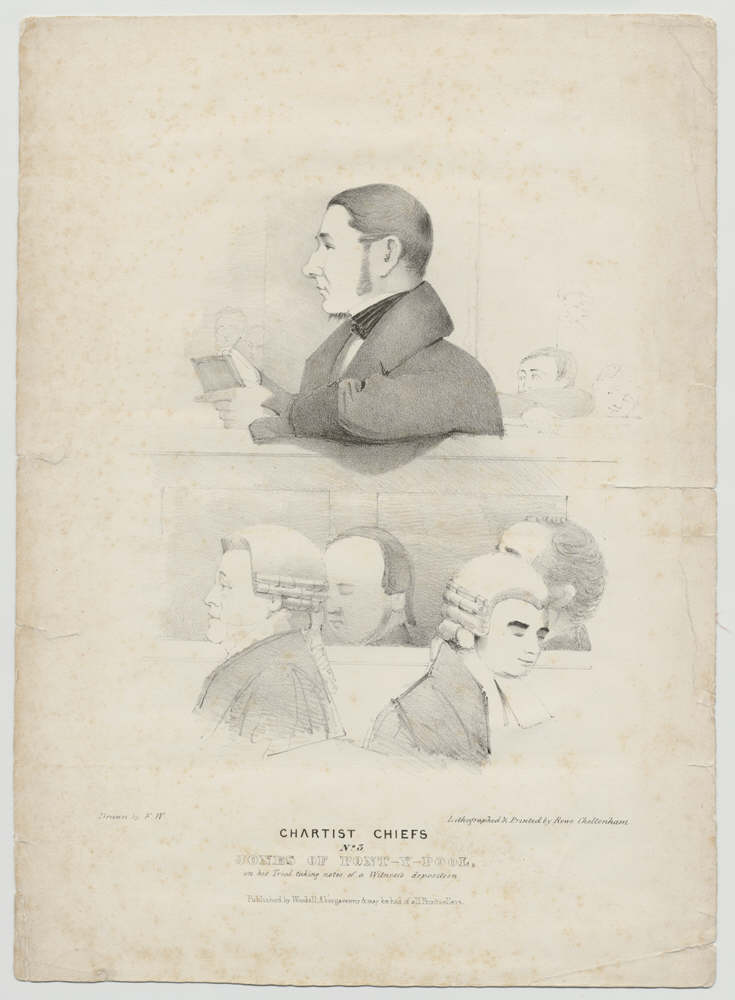William Jones (Chartist) on:
[Wikipedia]
[Google]
[Amazon]
William Jones (1809–1873) was a political  He was captured a few days after the rising. He was imprisoned in
He was captured a few days after the rising. He was imprisoned in
Radical
Radical may refer to:
Politics and ideology Politics
* Radical politics, the political intent of fundamental societal change
*Radicalism (historical), the Radical Movement that began in late 18th century Britain and spread to continental Europe an ...
and Chartist, who was a former actor, working as a watchmaker at Pontypool
Pontypool ( cy, Pont-y-pŵl ) is a town and the administrative centre of the county borough of Torfaen, within the historic boundaries of Monmouthshire in South Wales. It has a population of 28,970.
Location
It is situated on the Afon Lwyd r ...
in Monmouthshire
Monmouthshire ( cy, Sir Fynwy) is a county in the south-east of Wales. The name derives from the historic county of the same name; the modern county covers the eastern three-fifths of the historic county. The largest town is Abergavenny, wit ...
and also kept a beer house.
He was prosecuted for his part in the Chartist Newport Rising at Newport, Monmouthshire
Newport ( cy, Casnewydd; ) is a city and county borough in Wales, situated on the River Usk close to its confluence with the Severn Estuary, northeast of Cardiff. With a population of 145,700 at the 2011 census, Newport is the third-largest au ...
on 4 November 1839.
Along with John Frost and Zephaniah Williams, he was appointed a leader of a column of men in what is sometimes regarded as the greatest armed rebellion in 19th-century Britain.Edward Royal, ''Chartism'', Longman, London: 1996
Jones was supposed to be bringing men to Newport from the Pontypool area and the eastern valleys of Monmouthshire on the night of the rising, but they never arrived, delaying the main body of Chartists final march into Newport into the daylight hours and thus partly contributing to its defeat.
 He was captured a few days after the rising. He was imprisoned in
He was captured a few days after the rising. He was imprisoned in Monmouth County Gaol
The County Gaol, situated in North Parade, Monmouth, Wales, was Monmouthshire's main prison when it was opened in 1790.Newman J., The Buildings of Wales: Gwent/Monmouthshire, (2000) Penguin Books, page 407 It served as the county jail of Monmouth ...
and placed on trial at the Shire Hall in Monmouth. He was sentenced to death for High Treason
Treason is the crime of attacking a state authority to which one owes allegiance. This typically includes acts such as participating in a war against one's native country, attempting to overthrow its government, spying on its military, its diplo ...
, but his sentence was commuted and he was sentenced to penal transportation
Penal transportation or transportation was the relocation of convicted criminals, or other persons regarded as undesirable, to a distant place, often a colony, for a specified term; later, specifically established penal colonies became thei ...
to Australia for life.
Exile in Australia
While in exile, members of the Chartist movement continued to advocate for the repatriation of the leaders of the Newport Rising. In March 1847, the House of Commons debated a proposal for their repatriation, but it was defeated by 196 votes to 31 (including the vote of Disraeli). The convicts won partial pardon in 1854 and total pardon in 1856. John Frost returned to England. Jones decided to remain behind in Australia and stuck by his watchmakers's trade. He died in poverty in 1873.See also
*List of convicts transported to Australia
Penal transportation to Australia began with the arrival of the First Fleet in 1788 and ended in 1868. Overall, approximately 165,000 convicts were transported to Australia.
Convicts
A
* Esther Abrahams (c. 1767–1846), English wife of G ...
References